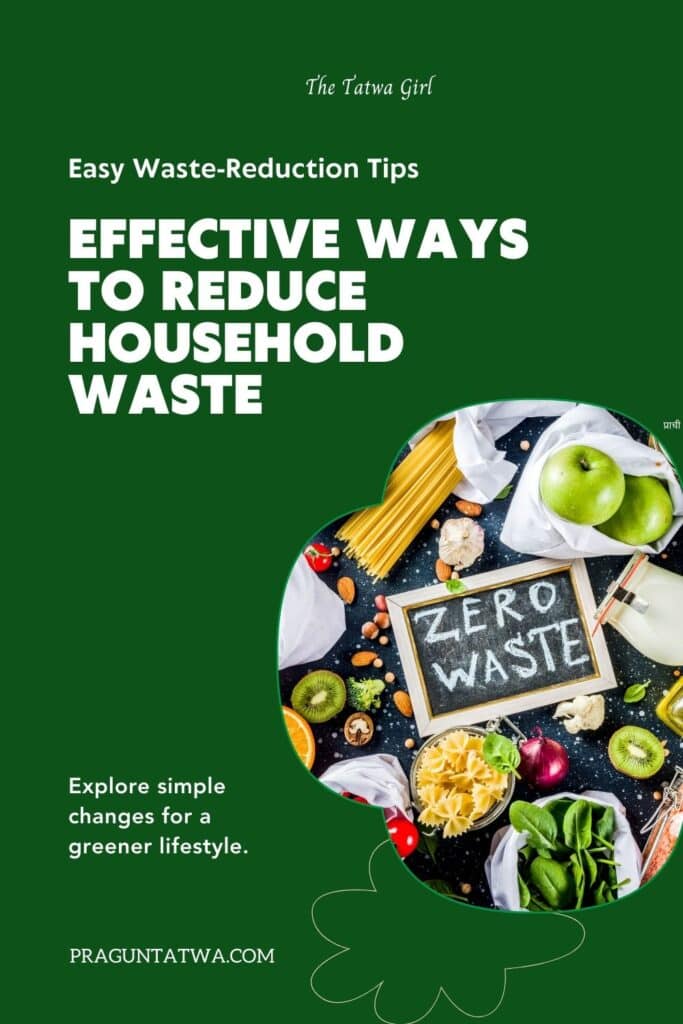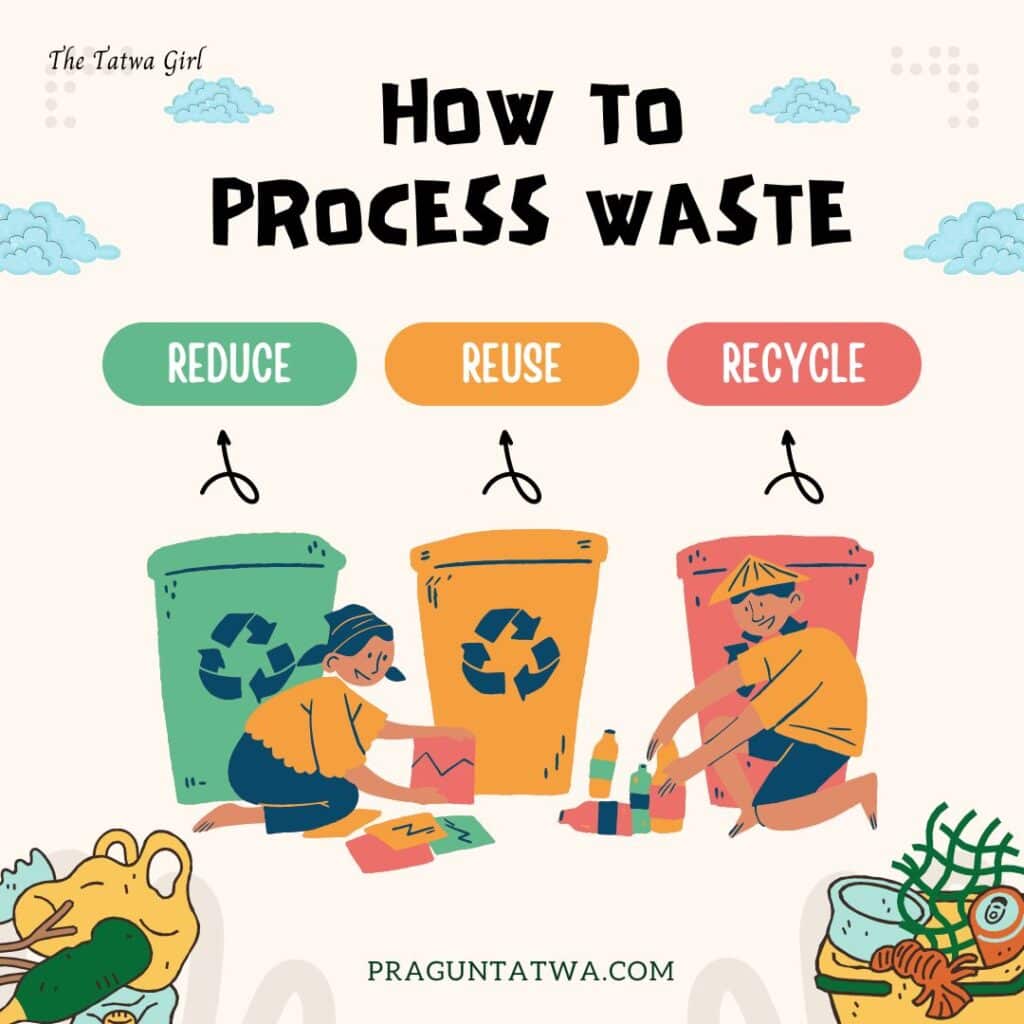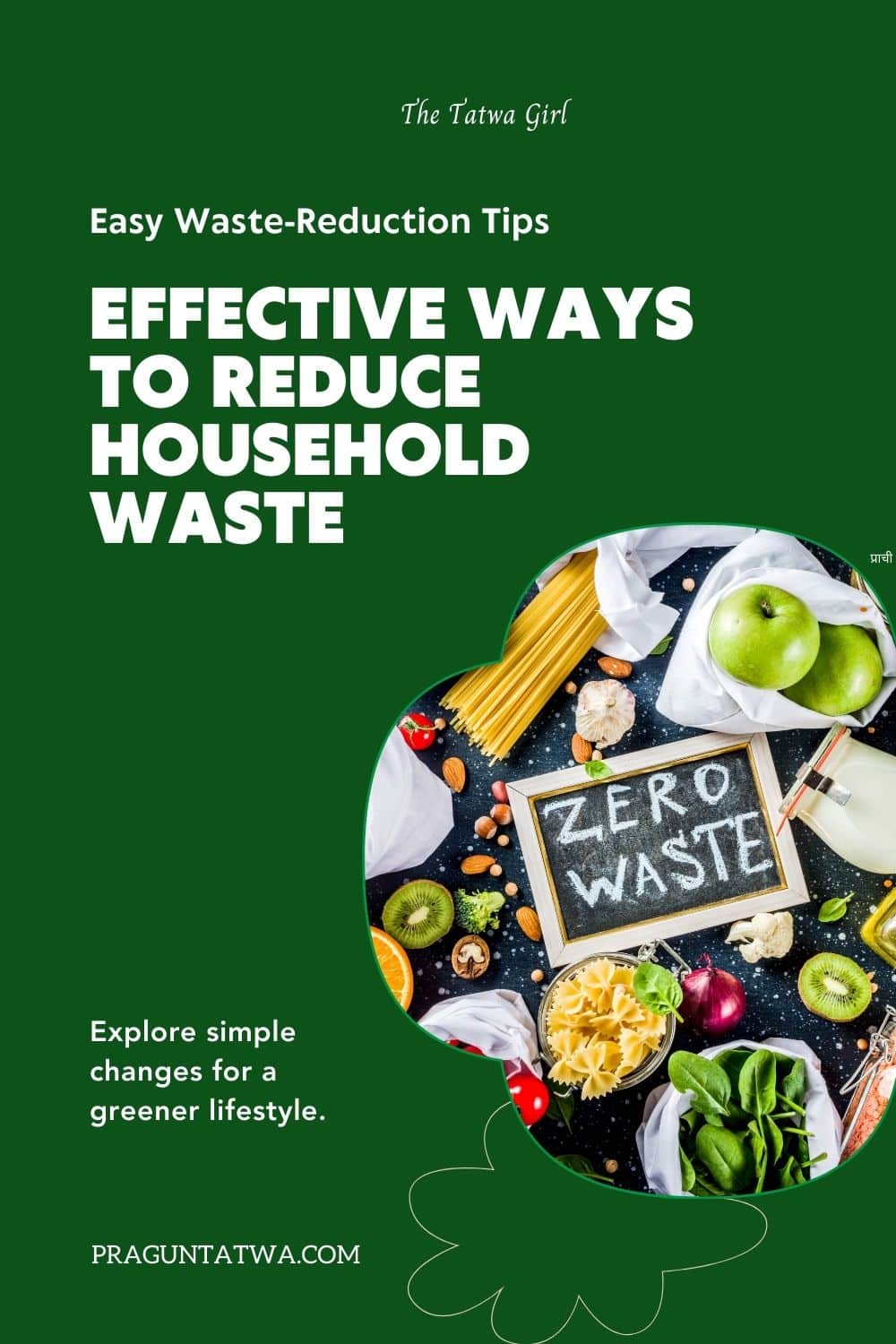I am often asked how to reduce waste and live sustainably. What do you do to live an eco-friendly life? Well, there is no rocket science or fixed rules for a zero-waste lifestyle. One just needs to be cautious and conscious of our surroundings and what we buy as well as what we throw away. If you want to live a more sustainable lifestyle and reduce your waste, there are many small changes you can make in your day-to-day life. These changes can help ensure that less of your trash is going into landfills and oceans, which will have a positive impact on the environment. Living greener doesn’t always require drastic change, like moving to a treehouse or foraging for herbs. All it takes is a few minor tweaks in your daily living to cut down your waste count by a significant amount. REDUCE is my most favored word when it comes to waste.
Reducing daily waste is important for several reasons:
- Environmental impact: Waste that ends up in landfills or the environment can have a negative impact on the environment. It can pollute air, water, and soil, harm wildlife, and contribute to climate change.
- Resource conservation: Many of the materials that make up our waste, such as paper, plastic, and metals, are resources that require energy and resources to produce. By reducing waste, we can conserve these resources for future use.
- Economic benefits: Reducing waste can also have economic benefits, such as reducing the cost of waste management, saving money on disposal fees, and potentially creating new jobs in recycling and waste reduction industries.
- Personal responsibility: Reducing waste is a way to take personal responsibility for our impact on the environment. It allows us to make conscious choices about our consumption and waste generation, and to contribute to a more sustainable future.
Overall, reducing daily waste is an important step toward creating a more sustainable and environmentally friendly future for ourselves and future generations.
Tips, tricks, and tweaks to start living sustainably.
The first thing that comes to mind when you think about living greener is making changes. You might think you need to overhaul your entire lifestyle to go green. But, there are small things you can do each day that will have a big impact on the environment. With a few simple tweaks, you can start feeling better and make the world a better place at the same time.
Reducing waste is an important and simple yet effective way to help the environment and live a more sustainable lifestyle. Here are some easy ways to cut down on waste in your everyday life, that can help towards creating a more sustainable and environmentally-friendly future. These small ways will make a bigger difference than you might expect.

Here are some tips on how to cut down on waste:
-
Reduce your consumption:
One of the most effective ways to cut down on waste is to reduce the amount of products you consume. This can include buying only what you need, avoiding single-use items, and choosing products with minimal packaging.
One of the most important things you can do to reduce your waste is to buy only what you will use. When we think about the impact that our actions have on the environment, it’s easy to blame others for excessive use of resources. However, if we all make small changes in our daily lives, we can create a huge difference. One way to reduce your garbage output is by purchasing less food.
Buy only what you will eat and enjoy. This doesn’t mean that picky eaters need to stop being picky; it just means that they should forego the impulse buy of a food item they know they won’t like or eat within the designated time frame for spoilage.
-
Reduce food waste
Plan your meals ahead of time to reduce food waste store leftovers properly and reuse them timely.
-
Reduce waste at the source
Trying to reduce the amount of waste generated at the source of waste generation, or the waste must be treated before discharge from the source.
-
Buy in bulk:
Purchasing items in bulk can reduce packaging waste and save money in the long run.
-
Use reusable grocery bags and bottles
Bring reusable bags when shopping. Instead of using single-use plastic bags, bring reusable bags when you go grocery shopping or running errands. Buy in bulk and store them in reusable containers like mason jars or cloth bags.
-
Use a refillable water bottle
Rather than buying bottled water, invest in a refillable water bottle that you can take with you on the go. Invest in a good bottle and carry water from home or refill to from available sources instead of buying a disposable water bottle.
-
Use Cloth/ jute bags.
Investing in (and remembering to bring) a set of cloth produce bags will protect your purchases and prevent more plastic from ending up in the ocean. These bags are great for transporting bulk goods, too. There’s no doubt about it, plastic bags are everywhere. And with the simple act of picking one up, you’re adding to the amount thrown away every day. So what can you do?
The most obvious answer is to stop using them altogether. Don’t use plastic bags while grocery shopping and always bring your own cloth bag to the store. If you forget your reusable bag, don’t let that stop you from carrying home your groceries in your arms or in a backpack.
-
Carry a reusable cup and bottle
If you get coffee or tea on the go, bring your own reusable cup instead of using disposable cups.
-
Say no to plastic straw
When drinking soft drinks or any beverage, refuse straws. Or else carry a reusable straw made of steel, glass, or bamboo.
-
Avoid single-use plastic products instead Use a reusable plate, cup, and or glass.
Use reusable plates, cutlery, and straws.
-
Ditch disposable
If you have a business, chances are you offer some type of disposable product. Whether it’s paper products like napkins and plastic utensils, or food items like forks and cups, these things cost your business money. And that’s not the only thing they do to your budget…
These disposable goods are bad for the environment because they end up in landfills where they take hundreds of years to decompose. But they’re also bad for your finances! Disposable products will increase your expenses since you’ll be spending more money on product while wasting more in upkeep. And what kind of an environmentalist are you if you’re contributing to the degradation of our planet?
Fortunately, there’s a better way: You can invest in reusable products.
Reusable items not only help lower costs by reducing waste and upkeep but they also help consumers protect the environment so we can all keep living here. With reusable products, consumers can save themselves from having to buy new ones each time and the planet from the burden of disposable objects piling up – which could make both parties happy!
-
Avoid products wrapped in plastic and choose products with minimal packaging
Avoid buying products, veggies, and fruits in shrink wrapping or cling film wrappings. Opt for products with minimal packaging, or packaging that can be recycled or reused.
One way to reduce the amount of waste you produce is by buying products with less packaging. This is a simple method that doesn’t require too much effort and can really add up over time. By purchasing products with minimal packaging, you will be sending less of your waste to landfills. This can be done by looking for items like fresh foods or canned goods without any extra packaging as well as products that have recyclable boxes or containers.
It may take more time to find the desired product, but it will be worth it in the end. Not only are you protecting the environment from unnecessary trash, but you are also saving money on wasted food because there is less spoilage due to packaging.
-
Replace paper with cloth
-
Reuse and repurpose
Instead of throwing away items that are still in good condition, consider reusing or repurposing them. For example, use old jars for storing food or use old t-shirts as cleaning rags. Find out the reusable materials from the waste and reuse them.
-
Avoid using tea bags
Most tea bags are loaded with microplastics that are bad for you and the environment. But have no fear: loose-leaf tea is here! Pick up an in-mug strainer or a set of reusable cloth tea bags and you’ll be on your way to a delicious, sustainable brew in no time!
-
Make your own cleaning prodcuts
-
Recycle properly
Make sure you understand what can and cannot be recycled in your area, and take the time to properly sort your recyclables. This can help ensure that they are actually recycled and not sent to a landfill. Recycling of various waste materials, that can be effectively put to use at some other place.
-
Repair instead of replacing
If something breaks, try to repair it before considering buying a replacement.
-
Segregating the waste into ‘Biodegradable’ and ‘Non – Biodegradable waste.’
Ensuring proper waste disposal, like a sanitary landfill, incineration, and other processes of waste disposal must be carried out under supervision and by following emission norms.
-
Compost:
Composting is a great way to turn food scraps and other organic materials into nutrient-rich soil. This can help reduce the amount of waste that ends up in landfills and can also help you grow your own food. Instead of throwing away food scraps, consider composting them to create nutrient-rich soil for plants.
-
Choose sustainable products:
When you do need to buy new products, choose ones that are sustainably produced and made from environmentally friendly materials.
-
Buy second-hand or reused old items
These days societies, colonies, and many groups are offering local buy and sell so you can choose from the available products.
This is more than just a tip for saving money. If you buy second-hand, it also means your not having to create as much waste in the process of making new things. Saving money and helping the environment can both be accomplished by buying second-hand.
If you’ve got a closet full of clothes that are barely worn, why not sell them? You most likely have some pieces from your wardrobe that are worth selling, but you might have forgotten about them or don’t know what to do with them. The best option is to list these items online and make some cash off of something you may have never used again.
Another way to buy second hand is by shopping at thrift stores. These can be great sources for clothing (or any other items) that are priced less than they would be if purchased new. Thrift store shoppers often reflect an eco-friendly lifestyle and appreciate the chance to purchase unique, quality products while also doing their part to reduce materials that end up in landfills.
-
Use digital instead of printing a paper or bills
Switch to digital documents to save on paper and ink. Use paperless bills and digital receipts.
-
Try carpooling instead of driving alone
Opt for carpooling and share your drive. Every individual traveling alone just adds up to an added carbon footprint.
-
Support your local farmer
-
Turn off electronics when not in use
Please don’t forget to switch off the light when not in use.
-
Check the air filters of your car
A dirty air filter can reduce your vehicle’s fuel economy by up to 10%. Read your car’s user manual to figure out what type of filter you need, and how to change it out.
-
Donate
Instead of throwing away old items, donate them to a charity or recycle them. One idea is to donate your used goods. Whether it’s clothes, furniture, books, or other unused items, donating them to a charity will help someone in need.
As you get ready for the New Year, think about what you don’t need and who could use it! The Salvation Army has a list of materials they are currently accepting.
-
Educate others
Finally, don’t be afraid to share your knowledge with others. Encourage your friends and family to join you in your efforts to reduce waste, and spread awareness about the importance of sustainability.
-
Plant Trees
Last but not least, plant a tree whenever possible. Gift a tree instead of expensive gifts that are of no use.

From My Green Bag
To sum up, This is my conscious lifestyle post to spread more awareness about sustainable living. Join me for more such ways and tips and become part of my Conscious and sustainable living journey. Keep visiting my blog to make yourself eco-friendly, aware of conscious and sustainable choices and be more concerned for our environment, and alter your lifestyle.
To add on, read and listen to my Green Talks series and check out interviews with Eco-conscious people who are trying their bit towards conscious and sustainable living practices. There is so much to learn and explore from all of them I have interacted with, do listen and drop in your views in the comments. Check here to learn more about all the Eco-Friendly dates.
Being Eco-Friendly is not a choice, make it a habit.
Without a doubt, sustainability is easier than you think. You don’t have to jump in by changing everything, start small to make the changes more eco-friendly, sustainable and a part of your daily life.

Leave a Reply